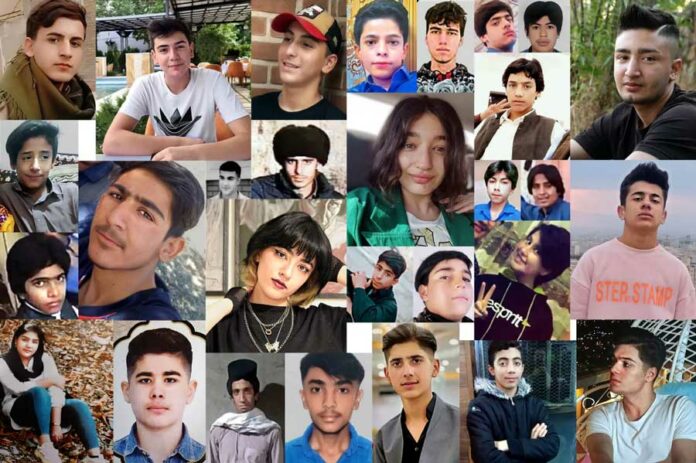Young protesters detained in Iran were tortured in prison, and are at imminent risk of execution, according to a Jan. 27 report by human rights watchdog Amnesty International.
Arshia Takdastan, 18, Mehdi Mohammadifard, 19, and Javad Rouhi, 31, were “forcibly disappeared, and otherwise ill treated” to extract confessions, the report said. Ill treatment included rape and others forms of sexual violence, death threats at gunpoint, electric shocks, solitary confinement and floggings.
Iranian Protester Receives Three Death Sentences for Non-Capital Crimes
The two teenagers and the young man were convicted of “corruption on earth” and “enmity against God,” and sentenced to death by Iran’s Revolutionary Court. The court held they had “incited riots” by “dancing, clapping, chanting or throwing headscarves into bonfires.” They were arrested in connection with protests in Noshahr, the capital city of Nowshahr County, in Mazandaran Province. Appeals for the defendants were submitted to the Supreme Court.
“The fact that Arshia Takdastan, Mehdi Mohammadifard and Javad Rouhi and their anguished relatives live under the shadow of execution, while Revolutionary Guards agents and prosecution officials reasonably suspected of responsibility or complicity in their sexual abuse and other forms of torture enjoy absolute impunity, highlights the sheer cruelty and inhumanity of Iran’s judicial system,” said Diana Eltahawy, Amnesty International’s deputy director for the Middle East and North Africa, in a Jan. 27 press release.
More than 170 children and 717 students were arrested during the latest wave of anti-government protests which began in September, according to Human Rights Activists In Iran (HRANA). An estimated 71 children were killed by Iran’s security forces during the largely peaceful demonstrations.
The protests were sparked by the death of 22-year-old Kurdish-Iranian Jina Mahsa Amini while in police custody. She was detained for allegedly breaching the country’s mandatory dress code for women. Amini was beaten by officials during questioning and later died of her injuries.
Iran Executions Amount to ‘State Sanctioned Killing’: UN Rights Chief
Iran’s Regime ‘Built on Repression, and Women Its First Target,’ UN Expert Says
Amnesty said the accused were subjected to “grossly unfair trials,” including denial of access to independent lawyers during the investigation process, and one court hearing each lasting less than one hour.
“It is abhorrent that while the majority of the world’s states have consigned the death penalty to history, the Iranian authorities are increasingly imposing it for offenses such as arson or vandalism, in gross violation of international law,” Eltahawy said.
Amnesty said the defendants had also sustained serious injuries as a result of their torture.
Takdastan was told by officials that he would be shot dead and his father killed if he did not confess on video, while a gun was pointed at his head. He was placed in solitary confinement for 18 days and his whereabouts concealed from his parents. The Revolutionary Court’s verdict —which was reviewed by Amnesty — made references to evidence used at trial, including a text message from Takdastan to news outlet Iran International. Takdastan thanked the outlet for “standing behind the people” and asked them to “keep encouraging the people so that the Islamic Republic is suppressed,” according to the verdict.
Mohammadifard was severely beaten during his arrest on Oct. 2 and suffered a broken nose. Amnesty learned that Mohammadifard was then beaten and raped while in prison. He suffered rectal bleeding as a result of the rape and was transferred to a hospital outside the prison. Mohammadifard was returned to prison before he had healed. His family was not allowed to visit him until after he was sentenced to death in December.
Rouhi was held in solitary confinement for six weeks following his arrest, was threatened at gun point, and his parents blocked from visiting him until after his death sentence was issued in December, Amnesty said. He was subjected to severe beatings and floggings, electrically shocked with tasers, and had ice put on his testicles for 48 hours. Rouhi sustained an injury to his rotator cuff, developed urinary incontinence, and speech impairment. He was then hospitalized for 48 hours, due to his injuries.
Child welfare charity Save The Children urged the United Nations to examine the treatment of children during the protests in a Nov. 7 press release. It also requested an immediate stop to the violent crackdown by security forces on demonstrators, and said any forms of violence against children were “unacceptable.”
UNICEF said it condemned “all violence against children” in Iran, in a Nov. 27 press release, and that it had communicated its concerns directly to officials in the country. It called on the Islamic Republic of Iran as a party to the Convention on the Rights of the Child to uphold its “obligation to respect, protect and fulfill the rights of children to life, privacy, freedom of thought, and peaceful assembly.”
OPINION: The EU and Josep Borrell Have Thrown Another Lifeline to the Ayatollahs


